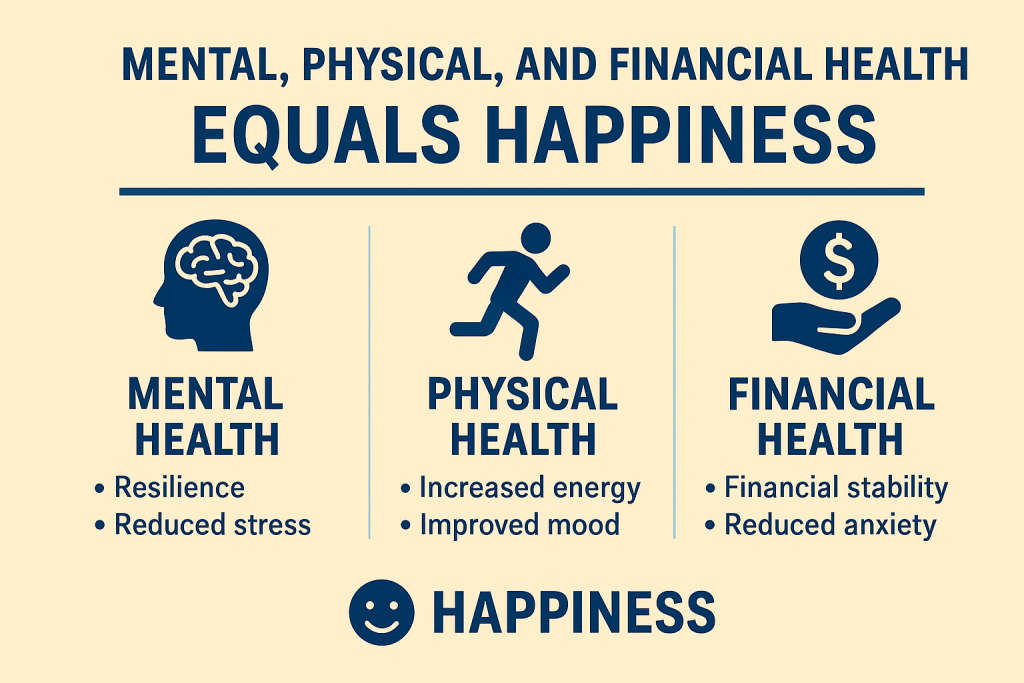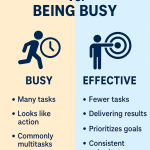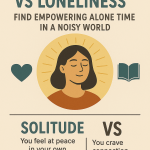Introduction: Why Mental, Physical, and Financial Health Equals Happiness
Focus keyphrase used in first 100 words
When it comes to living a fulfilling life, the formula is surprisingly simple: mental, physical, and financial health equals happiness. These three areas are deeply interconnected, and when balanced, they create a foundation for true well-being. You can meditate daily, eat healthy, or even earn a six-figure income, but if one pillar of health is neglected, happiness becomes fragile. Science shows that happiness is not only about feeling good—it’s also about resilience, energy, and freedom. In this post, we’ll break down how each area contributes to happiness, supported by research, and share actionable steps to bring balance into your life.
The Interconnection Between Mind, Body, and Finances
It’s easy to think of mental, physical, and financial health as separate worlds. But the truth is, they influence each other more than we realize.
- Financial stress can harm your mental health, leading to anxiety and even depression.
- Poor mental health can make it harder to exercise or eat well, harming your physical health.
- Neglecting physical health often results in higher medical costs, straining your finances.
When these three are balanced, you gain energy, clarity, and peace of mind, which ultimately makes life more enjoyable.
A 2021 study published in The Lancet highlighted that financial difficulties are among the top stressors negatively impacting both physical and mental health. This shows us that happiness isn’t about choosing one area to focus on—it’s about building strength across all three.
Mental Health as the Foundation of Happiness
The Role of Stress and Anxiety in Happiness
Mental health is often the hidden driver of our happiness. Chronic stress not only affects mood but also contributes to physical illnesses like high blood pressure and heart disease. According to the American Psychological Association, nearly 75% of adults report experiencing high levels of stress at some point, with financial stress being one of the leading causes. Building Resilience and Emotional Strength
Being mentally strong doesn’t mean ignoring emotions. Instead, it’s about developing resilience—the ability to bounce back from setbacks. Studies show that people with higher emotional resilience are happier, healthier, and even more financially successful.
Simple Practices for Mental Well-Being
- Mindfulness Meditation: Just 10 minutes a day reduces stress and improves focus.
- Gratitude Journaling: Writing three things you’re grateful for daily boosts mood.
- Therapy or Coaching: Professional guidance can help break cycles of stress.
When you care for your mental health, you gain clarity and motivation that make it easier to exercise regularly and manage money wisely.
Physical Health and Its Role in Lasting Happiness
Why the Body Matters in the Happiness Equation
Physical health isn’t just about looking fit—it directly impacts mood and energy. Exercise, for instance, releases endorphins and serotonin, the brain chemicals linked with happiness. According to Harvard Health, regular exercise reduces symptoms of depression as effectively as medication for some people.
Nutrition as a Happiness Booster
The food you eat affects brain function and emotional health. Diets rich in whole foods, omega-3 fatty acids, and vegetables are linked to lower rates of depression. On the other hand, processed foods and excess sugar have been tied to mood swings and fatigue.
Sleep and Recovery
Lack of sleep not only affects your physical performance but also your decision-making, which can lead to poor financial habits like impulsive spending. Prioritizing 7–9 hours of quality sleep improves focus, productivity, and happiness.
Actionable Tips for Physical Health
- Exercise 150 minutes per week (walking, strength training, or yoga).
- Eat balanced meals with proteins, vegetables, and healthy fats.
- Prioritize rest—power down screens at least one hour before bed.
A healthy body provides the stamina and energy needed to work effectively, save money, and enjoy life more fully.
Financial Health as the Missing Puzzle Piece
Why Money Affects Happiness
It’s often said that “money can’t buy happiness,” but financial health does provide freedom from stress. According to a 2021 Princeton University study, happiness continues to rise with income up to at least $75,000 per year because basic needs and comforts can be met without constant worry.
The Impact of Financial Stress on Well-Being
Debt, lack of savings, and living paycheck to paycheck are major causes of stress, which in turn affect mental and physical health. Chronic financial pressure can even lead to unhealthy coping mechanisms like overeating, drinking, or avoidance behaviors.
Habits for Financial Health
- Budgeting: Track income and expenses with simple apps like Mint or YNAB.
- Saving Consistently: Automate at least 10% of income into savings.
- Investing Wisely: Start small with index funds or retirement accounts.
- Emergency Fund: Aim for 3–6 months of expenses saved.
When you achieve financial stability, you free up mental energy and create opportunities for experiences that bring joy—travel, hobbies, and quality time with loved ones.
The Happiness Formula in Daily Life
Balancing the Three Pillars
You don’t need to master mental, physical, and financial health overnight. Instead, think of them as three spinning plates you’re keeping in motion. Sometimes one area needs more focus, but balance is the goal.
How They Work Together
- Mental + Physical: A strong mindset helps you exercise consistently.
- Mental + Financial: Reduced stress leads to better money decisions.
- Physical + Financial: Good health reduces medical costs and improves productivity.
- All Three Together: Sustainable happiness and freedom.
Case Study Example
Consider Sarah, a 35-year-old professional. She struggled with burnout, poor diet, and debt. By creating a daily exercise habit, she boosted her energy. With clearer thinking, she developed a budget and paid down her debt. The improved financial stability further reduced stress, making her more resilient and happy.
Studies That Prove Mental, Physical, and Financial Health Equals Happiness
- World Health Organization (WHO): Mental health issues are one of the leading causes of disability worldwide, proving their impact on happiness.
- Harvard Study of Adult Development: One of the longest studies ever conducted shows that health, strong relationships, and financial stability are key predictors of happiness.
- Journal of Happiness Studies (2020): Found that financial stability, combined with good physical health, increases life satisfaction significantly.
Practical Roadmap to Align Mind, Body, and Finances
Step 1 – Start Small
Don’t try to overhaul your life in one week. Choose one habit for each pillar:
- Mental: 5 minutes of meditation.
- Physical: 15-minute walk after work.
- Financial: Track all spending for one week.
Step 2 – Build Consistency
Success comes from consistent habits. Use reminders, habit trackers, or accountability partners to keep momentum.
Step 3 – Reassess and Adjust
Every 90 days, reflect on your progress. Are you sleeping better? Less stressed about money? More energetic? Adjust accordingly.
Time Management’s Role in the Equation
Many people feel there’s “no time” to work on these three pillars. But effective time management is the bridge. Prioritizing tasks, avoiding distractions, and scheduling self-care can help. For example, meal prepping saves both money and time, while ensuring healthy eating.
👉 For more on time strategies, see this helpful guide on time management.
Internal Balance and Relationships
Balancing mental, physical, and financial health doesn’t just impact you—it improves your relationships too. When you’re less stressed and more energized, you show up as a better partner, friend, and parent.
👉 Explore more insights on building healthier relationships.
The Happiness Mindset
Ultimately, the belief that mental, physical, and financial health equals happiness is more than a formula—it’s a mindset. It’s about prioritizing long-term well-being over quick fixes. Happiness is not found in extremes but in balance.
Conclusion
Happiness isn’t a mystery—it’s built by strengthening your mental, physical, and financial health. Together, they form the foundation for resilience, freedom, and joy. By making small, consistent improvements in each area, you can create a balanced, fulfilling life that truly feels good from the inside out.
Remember: Mental, physical, and financial health equals happiness. When you nurture these three pillars, you create not just a good life—but a great one.



